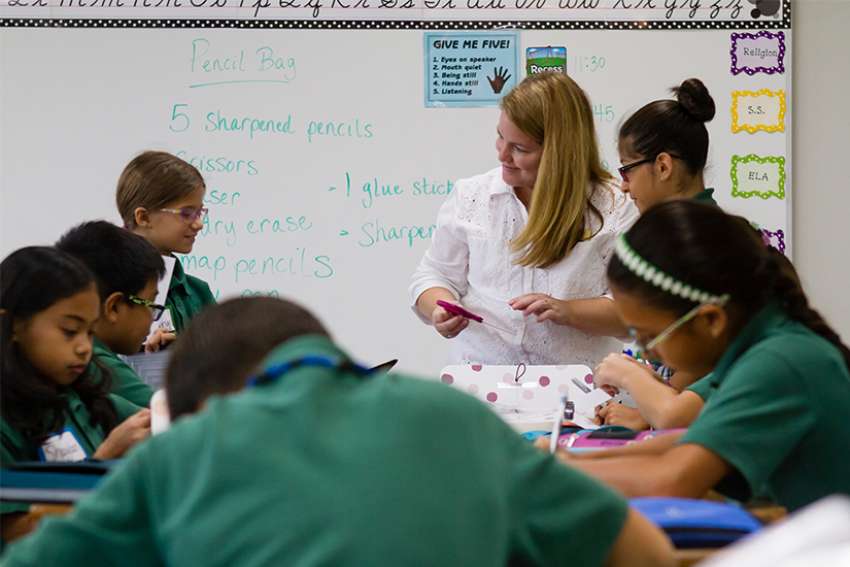Mark Siolek was one of about 5,000 people who attended the National Catholic Educational Association (NCEA) Convention and Expo in Cincinnati April 3-5. He came back impressed by the scale of the event and the professional development available to Catholic educators in the United States.
“They don’t take Catholic education for granted,” said Siolek, who runs the religious education course preparing teachers for Ontario Catholic Schools on behalf of the Toronto unit of the Ontario English Catholic Teachers Association. “Their schools depend on enrolment. It’s one thing we take for granted, especially when we talk about loss of identity. We allow for this loss of identity.”
The U.S. convention is clearly focused on the Catholic identity of schools through sessions and speakers that inspire teachers to infuse their teaching with faith, according to Siolek.
But the idea that a big convention can substitute for the slow, constant work of cultivating a Catholic culture and atmosphere in Ontario Catholic schools doesn’t persuade Institute for Catholic Education executive director Michael Pautler.
“I don’t think the faith aspect of the work that is done in Catholic schools can be supported on the basis of two- or three-day conferences. It’s a much more all-encompassing and all-consuming task,” Pautler said.
Still, Siolek would like to see change at Ontario’s answer to the big American convention known as When Faith Meets Pedagogy. The 2018 conference will run Oct. 25-27 in Toronto.
“At (When) Faith Meets Pedagogy there’s a very small faith component, I’ll tell you,” Siolek said. “Here we focus on literacy and numeracy and we forget about what makes us different than the other publicly-funded systems.”
Teachers need more help with their own faith formation, he said, and locally-delivered professional development days aren’t doing the job.
“Catholicity is always a part of events and activities planned for our members,” said NCEA public relations officer Margaret Kaplow. But the national association does not think of itself as the guarantor of Catholic identity.
“Each diocese and each school has the ultimate responsibility to maintain its Catholicity and receive guidance from the bishop or archbishop for the diocese.”
While Catholic identity is certainly discussed at When Faith Meets Pedagogy and on various PD days around the province, it’s important to note that the Catholic school system never views faith as a separate, secret ingredient added on-top of a regular education, said Pautler.
“The whole approach to ensuring the Catholicity of what is presented as curriculum in our Catholic schools is built around the way in which the faith component is entirely interwoven into the curriculum, delivered across all subject areas,” Pautler said. “It effectively fuses a Catholic worldview, Catholic values and understanding into a breadth of areas…. It would seem quite foreign, I think, to classify it as a separate thing — today we’re talking about faith and the rest of the time we’re just talking about professional development or curriculum. The two cannot be separated.”
Siolek does not dispute that the Institute for Catholic Education and the Catholic Curriculum Corporation take Catholic identity seriously. He simply doesn’t believe it filters down to the classroom.
“Things are created but then they are either just sent out in a mass mailing or they get stuck on a shelf,” he said.
The NCEA is focussed on communication, he said.
“They have to communicate better because it’s a key for their very existence,” said Siolek. “Our survival isn’t based on dedication to the system. It’s more that political entities don’t want to touch the issue of one school system because it’s divisive, right?”
“The Ontario context is very different as a publicly-funded system,” said Pautler.
Are there lessons to be learned from U.S. educators?
By Michael Swan, The Catholic RegisterBigger is better and if we don’t get better we’re going to get beat, is the message one religious education teacher has brought back from a giant American convention for Catholic teachers.
Please support The Catholic Register
Unlike many media companies, The Catholic Register has never charged readers for access to the news and information on our website. We want to keep our award-winning journalism as widely available as possible. But we need your help.
For more than 125 years, The Register has been a trusted source of faith-based journalism. By making even a small donation you help ensure our future as an important voice in the Catholic Church. If you support the mission of Catholic journalism, please donate today. Thank you.
DONATE

